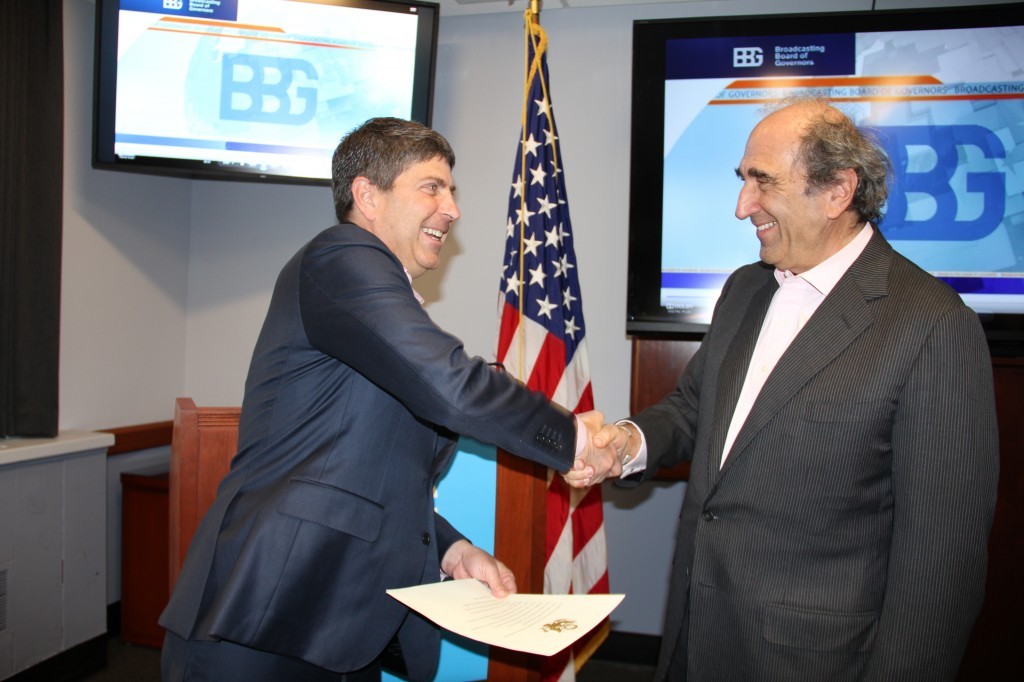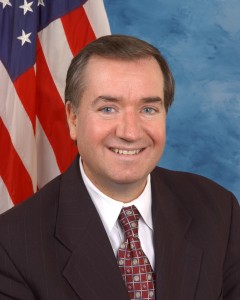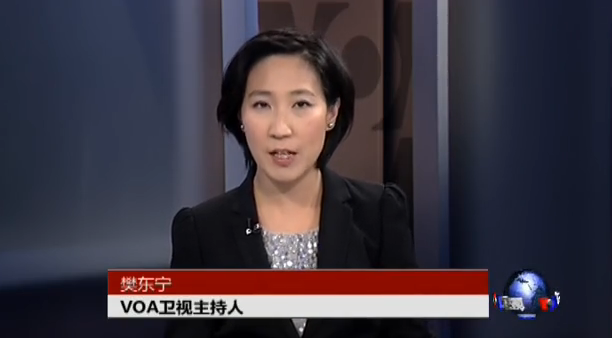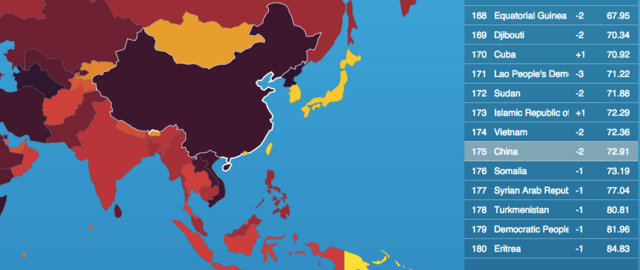
Jeff Shell, Chairman of the Broadcasting Board of Governors, congratulates Andy Lack after swearing him in as the first ever CEO of U.S. international media. (Image Source: BBG Press Release)
Below, you’ll find the full press release from the BBG regarding Andy Lack’s appointment. At the end of the press release I’ve noted another article from the NY Times.
(Source: BBG Press Release)
WASHINGTON – Respected journalist and media executive Andrew Lack was sworn-in today as the Chief Executive Officer and Director of the Broadcasting Board of Governors, the federal agency that oversees the five networks and broadcasting operations of U.S. international media. Those networks include the Voice of America, Radio Free Europe/Radio Liberty, Radio and TV Martí, Radio Free Asia, and the Middle East Broadcasting Networks.
Lack is the first-ever CEO of U.S. international media. Creating the position of a CEO has been a key objective of the agency’s governing board and the Administration.
“We are at a unique time in the extraordinary history of this agency. The 21st Century’s global war on information is increasingly threatening to our country and our values,” said Lack. “I am lucky to join a great group of journalists and news professionals spread across the globe who care so deeply about our critical role in that battle.”
Lack’s selection follows an almost year-long search process that began in October 2013.
“To say we are fortunate that Andy has agreed to accept this challenge is a huge understatement,” said Jeff Shell, Chairman of the BBG. “He is an experienced media executive, a respected journalist, and an energetic and inspirational leader. We are grateful that Andy has decided to serve his country and lead the BBG at this critical juncture.”
Prior to being selected by the BBG, Lack served as the Chairman of the Bloomberg Media Group. He joined Bloomberg in October 2008 as CEO of its Global Media Group and was responsible for expanding television, radio, magazine, conference and digital businesses.
Previous to joining Bloomberg, Lack was Chairman and CEO of Sony Music Entertainment, where he led the company’s roster of prominent international artists and vast catalog of recorded music from around the world. Before joining Sony Music Entertainment, he was president and chief operating officer of NBC, where he oversaw entertainment, news (including MSNBC and CNBC), NBC stations, sales and broadcast and network operations. He was responsible for expanding the Today show to three hours and creating the show’s street-side studio in New York’s Rockefeller Center.
From 1993 to 2001, Lack was president of NBC News, which he transformed into America’s most-watched news organization through NBC Nightly News, Meet the Press, Today and Dateline NBC.
Before going to NBC, Lack spent much of his television career at CBS News. After joining in 1976, within a year, he became a prominent producer for 60 Minutes and subsequently, senior executive producer of CBS Reports. Lack’s broadcasts at CBS earned numerous honors, including 16 Emmy Awards and 4 Alfred I. DuPont-Columbia University Journalism Awards.
Lack received a bachelor’s degree from the College of Fine Arts at Boston University, where he is currently a trustee.
SWLing Post contributor, Richard Cuff also notes this article about Andrew Lack from the NY Times. An excerpt:
Before Mr. Lack’s appointment, day-to-day international broadcasting operations were overseen by a board that had become known more for its dysfunction than for managing broadcast programs that reach more than 200 million people every week. Now, with Mr. Lack at the helm, the feeling in the agency and in Congress is that the broadcasting board is better positioned to counter the increasing hostile and suspicious views of Americans aboard, and more forcefully engage international rivals such as China and Russia in the high-stakes information war.
I was particularly drawn to to a quote by Ted Lipien, a former VOA staffer and outspoken critic of the BBG. Mr Lipen states:
“I’m quite optimistic, and if anyone can turn the organization around, it’s [Andrew Lack], given his background,” […]“But he faces immense challenges.”
Indeed, “immense challenges” may even be an understatement.
Bon courage to you, Mr. Lack! Let’s certainly hope for the best.








